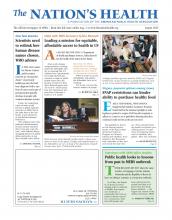Cuba has become the first country to eliminate mother-to-child transmission of HIV and syphilis, according to the World Health Organization.
WHO announced June 30 that Cuba was the first country to receive validation that it has eliminated the mother-to-child transmission of both infections. Validation requires meeting impact indicators, such as reducing rates of mother-to-child transmission of HIV and syphilis for at least one year, and process indicators, such as increasing rates of mothers being tested or treated for HIV or syphilis for at least two years, according to WHO.
In the 1980s, Cuba developed a task force to address the HIV/AIDS epidemic. Through that task force, the country created a program for the control and prevention of HIV/AIDS, modeled after other public health programs in the country.
Roberto Morales, MD, Cuba’s minister of public health, spoke on the strengths of the Cuban health care system on July 1 at the National Press Club in Washington, D.C.
Morales attributed Cuba’s success to programs for worker training and enhancing research designed to eliminate mother-to-child transmission of HIV and syphilis. Cuba has improved early access to prenatal care, HIV and syphilis testing for pregnant women and their partners, treatment for women and babies who test positive, caesarean deliveries, substitutes for breastfeeding and free antiretroviral drugs. As of 2013, Cuba had 15,600 people with HIV/AIDS in a population of more than 11 million. The United States had more than 1.2 million people over age 13 with HIV/AIDS in a population of more than 318 million.
Cuba has a strong health care system. Low doctor pay, state-controlled pharmacies, free medical education and a focus on preventive care are some of the reasons why Cuba has been successful in health care, according to a 2005 article in the International Journal of Health Services. A specialized doctor in Cuba can make up to $60 per month. The median pay for a family doctor in 2012 in the United States is about $207,000, according to the Bureau of Labor Statistics.
State-controlled pharmacies also allow the Cuban government to keep drug prices low. Government-paid medical education also allows more medical students to practice family medicine, because they do not have debt. Cuba’s focus on family doctors leads to a greater emphasis on preventive care, an area of health that can help lower costs, according to a 2013 article in the New England Journal of Medicine.
“The priority for our government has been the health of the Cuban population, which has allowed us to develop our human capital,” Morales said. “If we have been able to reach this point, it’s also because of the development of the pharmaceutical and biotechnological industry in Cuba.”
The United States severed diplomatic relations with Cuba in 1961 in response to the Cuban Revolution. After more than 50 years, President Barack Obama announced July 1 that the United States would reopen an embassy in Havana and re-establish diplomatic relations with Cuba.
The normalization of relations between the United States and Cuba could have effects on Cuba’s public health. For example, Cuba could now access new technologies and pharmaceuticals previously unavailable to the country, Morales said.
“Regrettably, the blockade has hurt health care,” Morales said. “The suffering it has caused cannot be calculated, so we therefore believe the lifting of the blockade should allow us to buy technology that cannot reach our country and will be a benefit to our country.”
In November, APHA signed a memorandum of understanding with the Cuban Society of Public Health to increase collaboration between the two organizations. APHA member delegations have been making regular trips to Cuba since 2010 to learn about the country’s health system.
Morales said he hopes that other countries can learn from Cuba’s model of health care as well.
“We believe the first thing that needs to exist is the willingness to push for the health of other organizations,” he said. “Health care has to be seen from the point of view of life.”
For more information, visit www.who.int.
- Copyright The Nation’s Health, American Public Health Association









